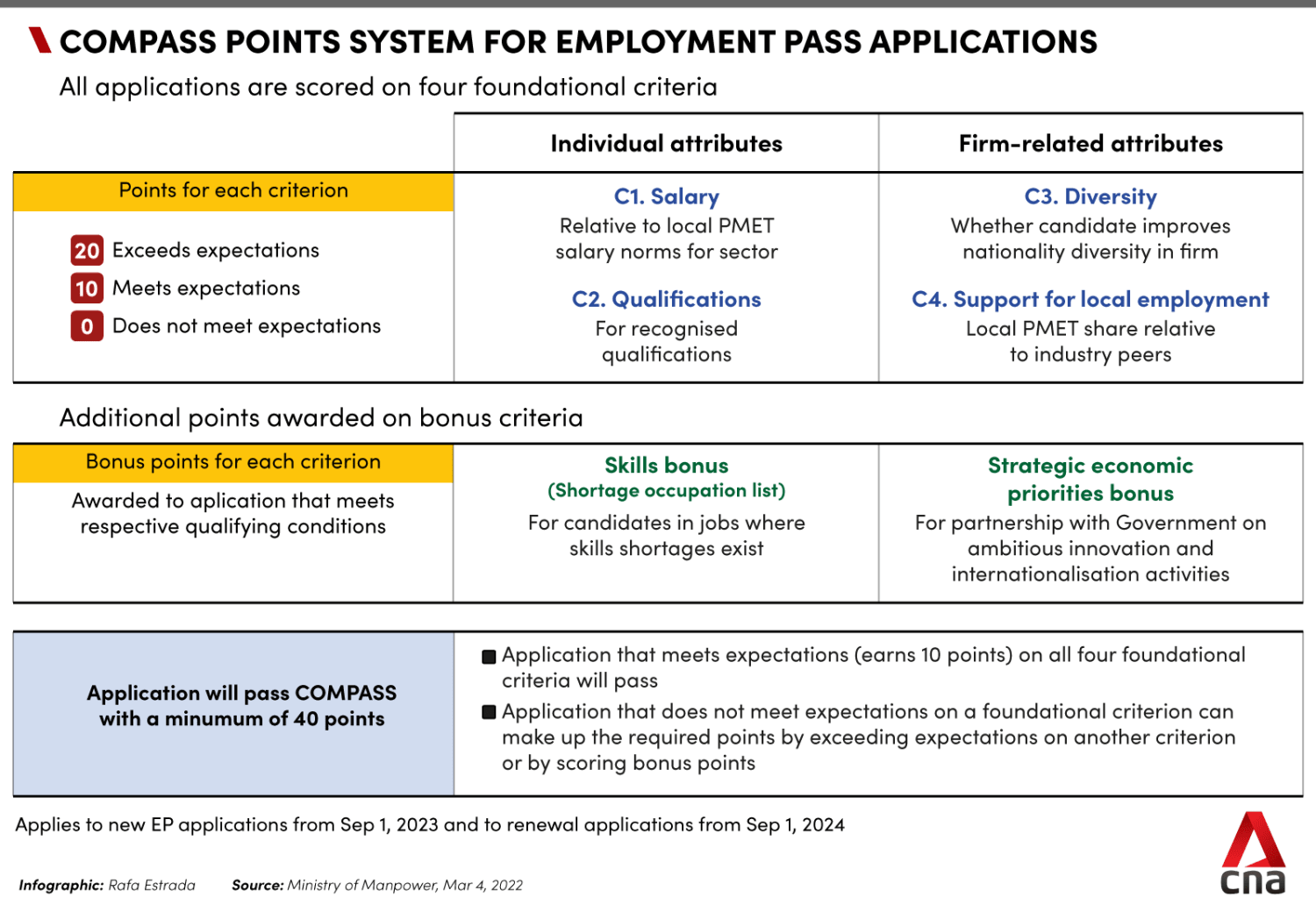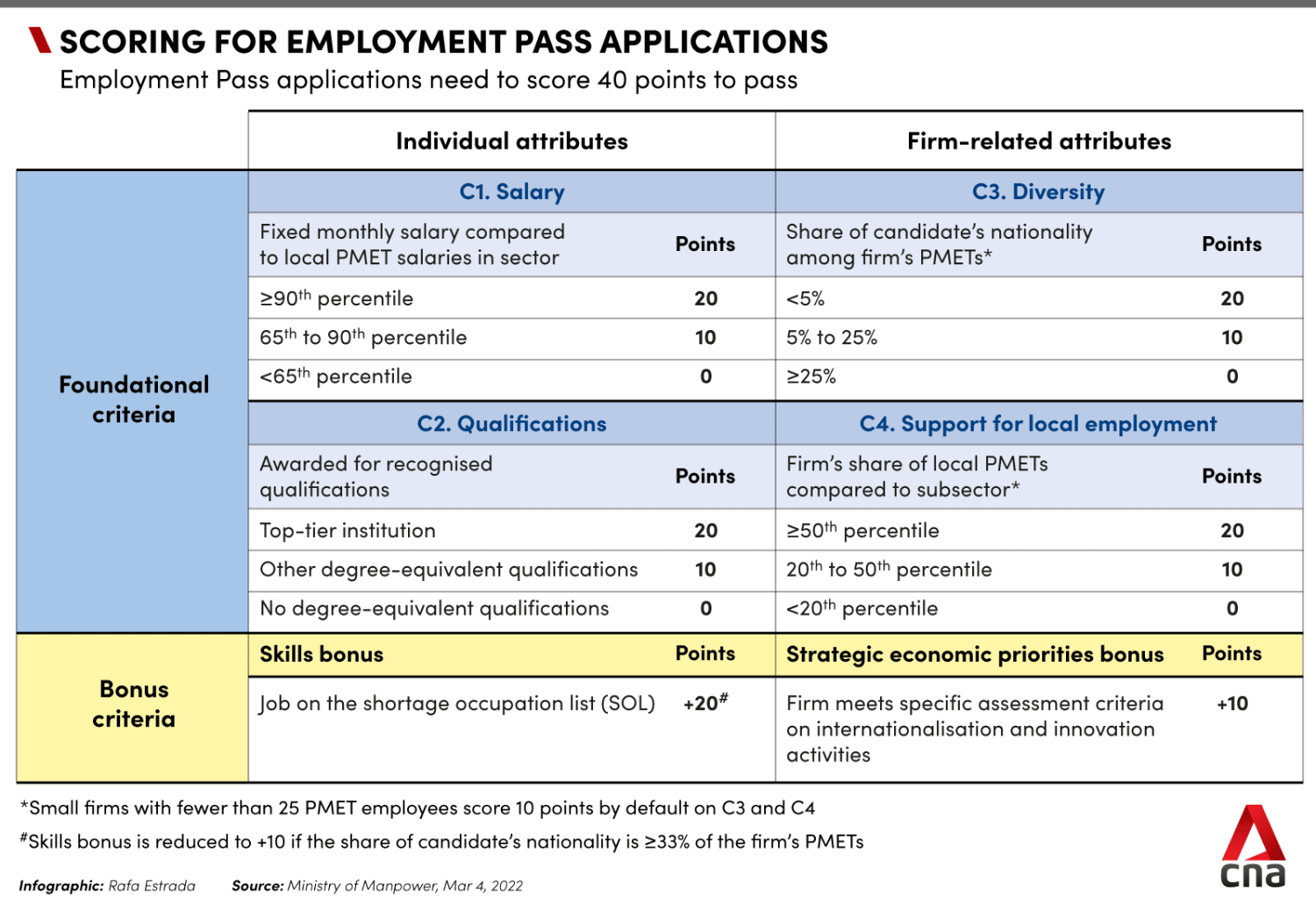

SINGAPORE: On top of meeting a minimum qualifying salary, foreigners wanting to work in Singapore under an Employment Pass (EPs) will also have to meet a minimum score under a points system from September next year.
The new framework comes as the Ministry of Manpower (MOM) is set to adjust the minimum qualifying salary for EPs up from S$4,500 to S$5,000 from this September. For the financial sector, the salary benchmark is set higher at S$5,500.
While S$5,000 or S$5,500 is the minimum salary for entry-level jobs, it goes up to S$10,500 for middle-aged candidates, or S$11,500 if they are in the financial sector.
The higher wage benchmark will apply to new EP applications from Sep 1 this year, and to renewal applications a year later.
EP applicants generally fill professionals, managers, engineers and technicians (PMET) jobs.
The intent is for EP qualifying salary to match the top one-third, or 65th percentile, of local PMET wages by age, said Manpower Minister Tan See Leng, as he announced the upcoming changes in Parliament during MOM’s Committee of Supply debate on Friday (Mar 4).
“We know that the labour market for skilled workers is sufficiently tight. So this latest move is not intended as a tightening measure,” he said.
“Instead, it is part of MOM’s regular updates to ensure that our qualifying salary keeps pace with local wage growth, so that foreigners are not coming in just because they are cheaper than local PMETs.”
He added that most EP holders will not be affected by these changes as they earn “well above the qualifying salary”.
From next year, applicants will also have to score sufficient points under a new COMPASS (Complementarity Assessment Framework) points system to work here.
It will come into effect for new EP applications from September 2023, and for renewal applications from September 2024.
Points under COMPASS will be awarded based on four attributes and two bonus criteria.
The EP application can score up to 20 points for each attribute – the applicant’s salary, his or her qualifications, the nationality diversity of the hiring firm and the firm’s support for local employment.
An individual and/or firm that meet the expectations for each attribute or criteria will score 10 points and if it exceeds expectations, it scores 20 points.

The applicant or firm can also score on two bonus criteria. One is a “Skills Bonus” for candidates in jobs where skills shortages exist, which can add up to 20 points.
The second is a “Strategic Economic Priorities Bonus” of up to 10 points – for firms that engage in innovation and internationalisation activities in partnership with the Government.
For example, applicants with a salary that meets the 65th to 90th percentile of local PMET salaries in the sector will score 10 points under the “Salary” attribute. They will get another 10 points under the “Qualifications” attribute if they hold a degree or its equivalent.
If the candidate exceeds expectations - like if his or her salary is above the 90th percentile, or if their educational qualifications are from a “top-tier institution”, they score 20 points.
There are also two attributes for the firm to meet.
The firm can score 10 points if the proportion of its employees with the same nationality as the applicant is between 5 and 25 per cent. It scores 0 if the proportion is more than 25 per cent, and 20 points if it is less than 5 per cent.
It scores another 10 points if the firm’s share of local PMETs is at the 20th to 50th percentile compared to its subsector.

Small firms with fewer than 25 PMET employees score 10 points on the diversity and support for local employment attributes by default.
This is as MOM recognises that for smaller firms, their workforce ratios can “change drastically” with a few personnel changes, said Dr Tan.
If the application meets expectations on all four attributes, it should pass with 40 points. If not, it could be approved using the bonus criteria.
Dr Tan said that COMPASS is not designed to make it harder for companies to obtain an EP and a majority of the applications today would pass.
“This is because our businesses in general are progressive, and our policies thus far have brought in complementary EP holders,” he said.
“Some firms, however, would need to make adjustments under COMPASS. And they would know clearly which areas to improve on and how to respond accordingly, given the transparency, clarity, and predictability of COMPASS.”
Dr Tan also said that the ministry has received feedback from employers who are concerned about bringing in young, high-potential employees under global rotation programmes.
To facilitate this, the ministry will pilot the Global Rotation Scheme, and the firm must also post Singaporeans abroad on the same leadership development programme.